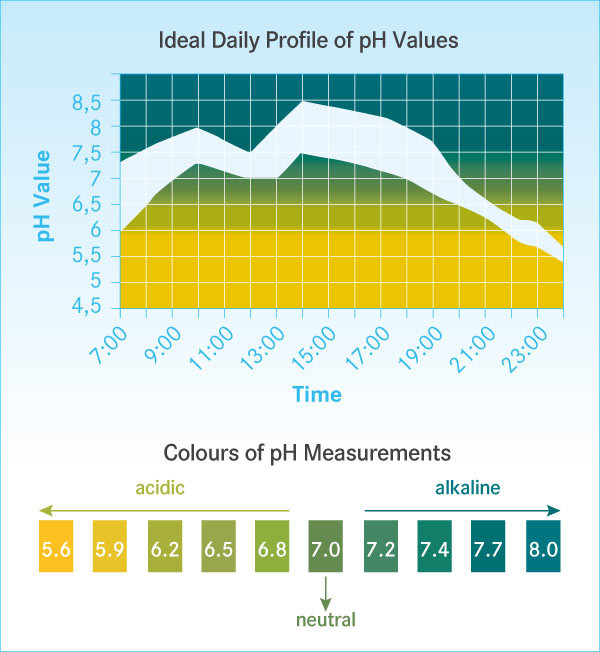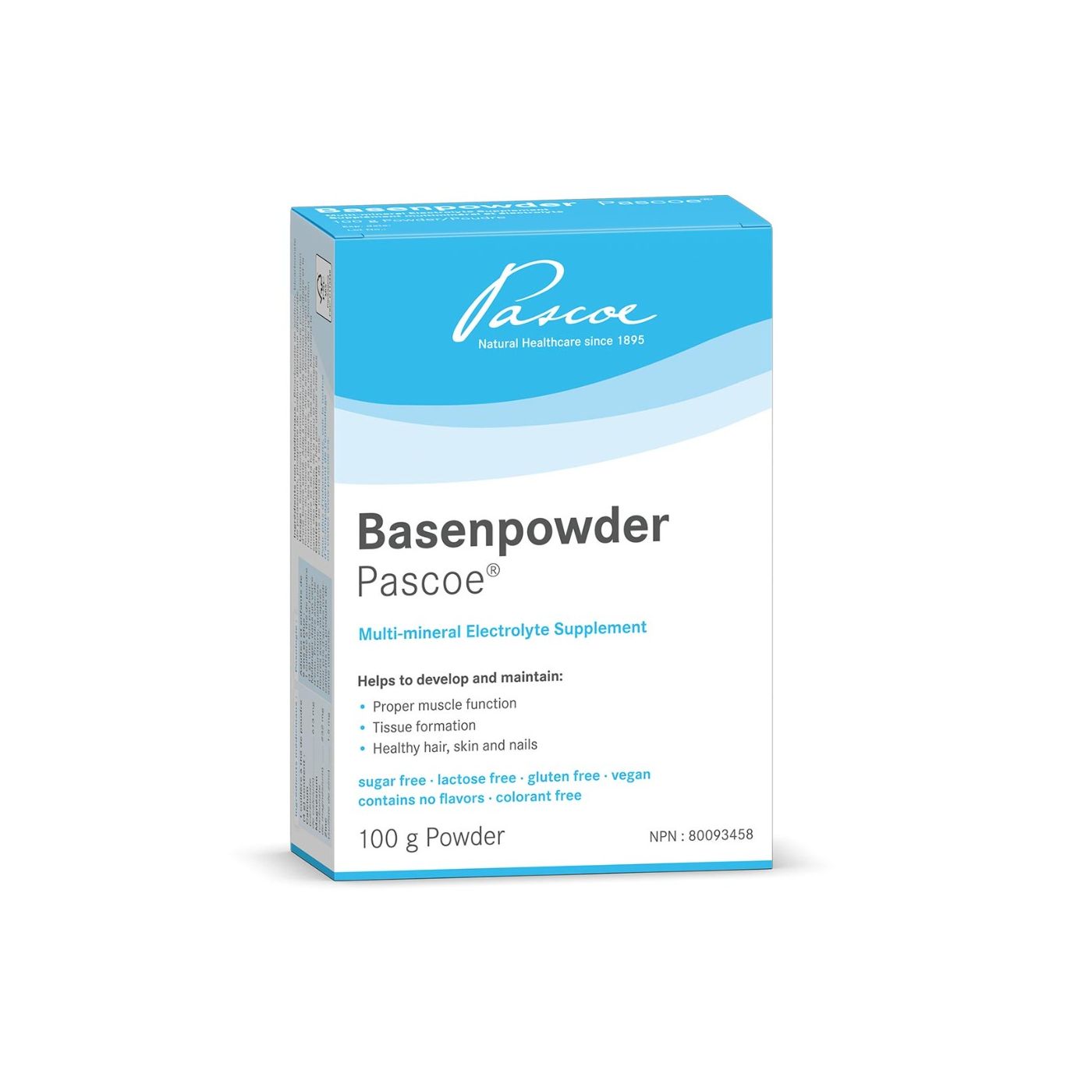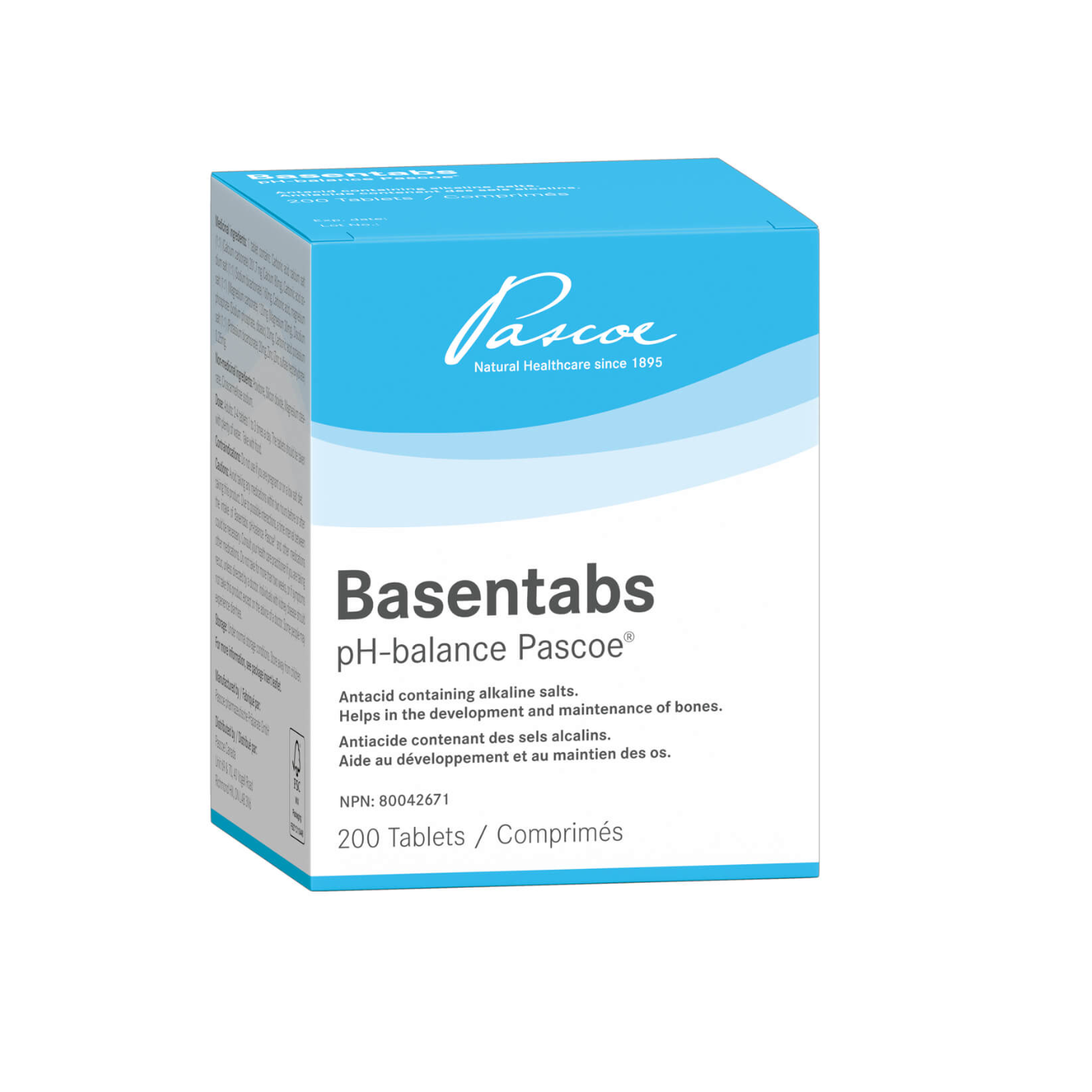

By Dr. Alexandra Sisam ND | Updated by Birgitta Kautz
Acid-base balance: the basis of health
Our metabolism is based on complex biochemical processes. Countless enzymes in our body convert our food into energy. These enzymes need a pH balance to function properly.
That is why it is important to ensure an optimal equilibrium of acids and bases in our bodies. Without this so-called acid-base balance, pH imbalance symptoms or even illness can occur.
Acid-base balance means the body's balance between acidity and alkalinity. Acidity and alkalinity are caused by acids and bases.
Acids are compounds that release positively charged hydrogen ions (H+) when in solution. Our stomach produces a strong acid, called hydrochloric acid, that aids digestion.
Bases are compounds that accept hydrogen ions when in solution. An example of a base is the negatively charged bicarbonate (HCO3-).
Both of these types of compounds are naturally occurring in our bodies. They also have their own functions in our bodies. The problems arise when the ratio between the acids and bases becomes skewed. This can cause parts of our bodies to become either too acidic or too basic, also known as alkaline.


The acid-base balance in the body is measured using a pH scale. This scale ranges from 0 to 14. A neutral pH, when the value of acids and bases is equal, is a measure of 7.
If the amount of bases in an environment is higher than of acids, the pH increases. A basic measurement ranges from 7.1 to 14. This is called an alkaline state.
On the other hand, an acidic pH occurs when there is an increased amount of acids in comparison to bases. These measures range from 6.9 to 1 and result in an acidic state.
Each organ system in our body requires a specific pH to perform its function. The stomach, for instance, functions well with an acidic pH from 1 to 4. A balanced vaginal pH level is slightly on the acidic side between 3.8 and 4.5. However, the pancreas needs a basic value.
Our optimal blood pH ranges between the narrow limits of 7.35 and 7.45. When the pH in the blood and body fluids increases from its normal, it is called an “alkalosis”. When the body pH decreases from its normal, it is called an “acidosis”.
Both are risk factors for chronic disease. They can also cause a wide range of symptoms including chronic fatigue, pain, weight gain and even osteoporosis.
Our modern lives often make it difficult to have a pH balance in our bodies. If you are suffering from persistent stress, chronic fatigue or an unbalanced diet, you might need support to regulate your acid-base balance.
Our metabolism naturally produces acids and bases every day. These acids and bases are affecting the pH balance of their environments. Our body has mechanisms in place to prevent changes in the normal pH of an area of the body. These "buffering systems" correct imbalances rapidly.
Kidneys: Main buffering system in the body is the washing out of acids in the form of uric acid with the urine.
Liver: Converts fats to acids which the kidneys can then excrete.
Intestine: Excretes acids via the stool.
Lungs: Breathe out acids in the form of carbon dioxide.
Skin: Gets rid of acids via sweat.
Connective tissue and muscle tissue: Can temporarily store excess acid.
Bones: The largest storage medium for basic minerals. These minerals can be mobilized when the body is too acidic to neutralize.
Blood: Contains bicarbonate which can bind acids resulting in a neutral compound.
All these systems are vital for maintaining an acid-base balance in our bodies. If they are stressed or overused, they can have serious health effects such as bone density and bone mass loss.
Therefore, a good acid-base balance is integral for both enzymatic and cell activity as well as the optimal functioning of all buffering systems.
There are four acid base disorders:
- (acute / chronic) Metabolic acidosis
- (acute / chronic) Respiratory acidosis
- (acute / chronic) Metabolic alkalosis
- (acute / chronic) Respiratory alkalosis
Acidosis means that the body's acid exposure becomes acutely or chronically high and thereby inhibits metabolic processes. It is more common than alkalosis, which means having a too alkaline body.
Acute metabolic acidosis can be caused by acute metabolic disorders such as diabetes, kidney disease or kidney failure. For instance, so-called diabetic ketoacidosis is a buildup of acids in the blood. This serious complication of diabetes is most common among people with type 1 diabetes.
Chronic metabolic acidosis usually develops unnoticed over years of chronic exposure to acidic compounds. Lifestyle factors such as a diet high in animal protein, excessive exercise, chronic disease, and stress can contribute to forming an acidic environment in the body.
On their own, these lifestyle factors are not necessarily harmful. However, when they become excessive or chronic, they are risk factors for metabolic acidosis.
Signs of metabolic acidosis in the body are rather nonspecific. If the body borrows minerals from the bones to bind acids, it can result in decreased bone mass or bone density. Other symptoms are chronic fatigue and exhaustion as well as skin, nail, and digestive problems. Further, the nervous system functioning can be impacted, causing brain fog, restlessness, and increased muscle cramps.
The body requires that blood has always a constant pH level, within a very narrow range of 7.38 to 7.42. In a perfect situation, the body will be able to regulate the pH using buffers.
However, in North America, most people are too acidic. They need acid-binding buffers such as alkaline minerals. For instance, calcium carbonate, sodium bicarbonate, and potassium bicarbonate have a high capacity to bind acids.
There are many causes of hyperacidity. For one, a diet with too much protein or processed food and not enough fruits and vegetables. Other major causes are stress, medications, external toxins and lack of exercise. Thus making simple lifestyle changes is a good way to begin supporting the body's acid-base balance.
Diet: A diet high in fruits and vegetables is called an alkaline diet. In addition to being alkaline foods, fruits and vegetables can help with inflammation. You can use the PRAL acid-alkaline chart as an easy way to check how much acid and base are produced from your daily food. Staying hydrated and drinking enough water are also important for the body's natural buffering systems.
Exercise and relaxation: A combination of exercise and relaxation helps to decrease the stress of our daily lives. Also, exercise promotes the movement of fluids and lymph in the body that can help the body to remove toxins. In addition, it can help the body to produce endorphins to increase our mood. Only when exercise is done in excess, it becomes a risk factor for lactic acidosis, due to a build-up of too much lactic acid in the bloodstream.
Minerals: Zinc is valuable for forming buffers. It also helps maintain healthy skin, the function of the immune system, and bones. Calcium and magnesium contribute to healthy muscle function and maintaining healthy bones. In addition, magnesium is involved in reducing tiredness and fatigue.
The abbreviation "PRAL" stands for "potential renal acid load". In essence, it looks at how acidic 100g of food is. The goal is to have a balanced diet to maintain the acid-base equilibrium or pH balance that our body needs.
Here you can download a PDF-of-the-PRAL-table with more than 100 foods.
One way to get an idea of the general pH of the body is by measuring urine pH. This can be done by peeing on acid-base pH strips. It is not a completely accurate test but can indicate if there is an acid-base disturbance in your body.
Basentabs is an antacid containing alkaline salts. It helps in the development and maintenance of bones.




